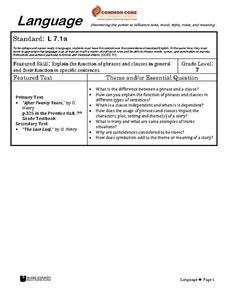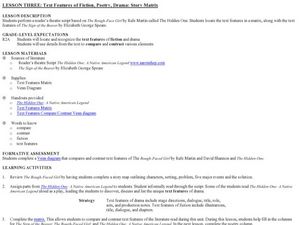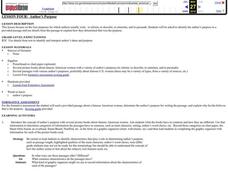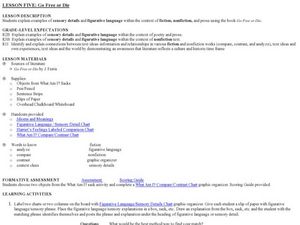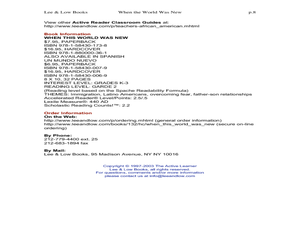Virginia Department of Education
Identifying the Main Idea in Fiction
Discovering the main idea in fiction is like uncovering buried treasure; one must persevere to locate it, and the reward is priceless. Scholars delve deep into leveled stories using three questions to aid in identifying the main idea.
Curated OER
O Captain! My Captain - Part 3
Heroic Trading Cards? Using a suggested list, class members use the Internet to find information about a memorable leader, select and transfer images, and craft a trading card celebrating their leader’s qualities and accomplishments. A...
Curated OER
Descriptive Writing Using the Book Rumpelstiltskin
Use the fairy tale Rumpelstiltskin to teach your third grade class about descriptive writing. Following a teacher read-aloud of the story, the class brainstorms a list of adjectives describing the main character. Students use this list...
Wake County Public Schools
Language
Have your class doing everything from reading literature, analyzing literary devices, identifying independent and dependent clauses, discussing, and writing creatively with the rich resource found here. After a mini lesson on independent...
Curated OER
Library Lesson Plan
Explain the differences between fiction and non-fiction and the characteristics of a biography. Learners analyze three pieces of literature on the same topic to determine which is fiction and which is non-fiction. In the end, relate the...
Curated OER
Digging Deep for Figurative Language (Hyperbole)
What are hyperboles? Examine the attributes of hyperboles with your high school classes. Pupils read selected poems and prose selections that feature hyperboles and discuss their functions in each work of literature. Specific poems and...
Premier Literacy
Point of View
Incorporate technology into a literature lesson with an innovative language arts lesson. Middle schoolers read an electronic version of original stories or fairy tales, and after determining the point of view, rewrite the tale from...
Curated OER
Saturday Market by Patricia Grossman
Readers make personal connections to Saturday Market by Patricia Grossman and answer comprehension questions while reading the book. Comparing and contrasting the different characters in a Venn diagram leads to a kinesthetic...
Curated OER
Bookmark It!
Young scholars analyze piece of literature for symbolism and create a bookmark containing an illustration of the symbolism in it, a quote that shows the symbolism and an explanation of how this symbolism enhances the work.
Curated OER
Cloudy With a Chance of Meatballs-Part I
Here is a lesson plan that gives learners a chance to practice using context clues. They read the story, Cloudy with a Chance of Meatballs. Learners use different word strategies (base words, synonyms, antonyms) to decode and understand...
Curated OER
Text Features of Fiction, Poetry, Drama: Story Matrix
How do novels differ from plays? Explore with your class the text features of fiction and drama by reading The Hidden One: Native American Legend and then performing a reader’s theater script based on the story. Class members create a...
Curated OER
Study Guide for Missing May
Use this comprehensive packet to accompany a study of Missing May by Cynthia Rylant. Starting out with a brief author biography and background information about the novel, this guide includes materials to use throughout the entire novel....
Curated OER
Author's Purpose
Readers identify the author's purpose. First, they read a passage and utilize details from the piece to determine the author's purpose. Then they will explain how they arrived at their conclusion. Links to materials are provided.
Curated OER
I'm a Changed Pig
Introduce your class to fairy tales with this lesson. After reading the fractured fairy tale, "The Three Little Wolves and the Big Bad Pig," third, fourth, and fifth graders write a personal narrative as a response to the fairy tale....
Curated OER
Go Free or Die: Figurative Language
Figures of speech, sensory details, and academic language are all targeted while reading Chapter Two of J. Ferris’ Go Free or Die. First, learners engage in an exercise to practice describing with detail. Then, partners use a...
Curated OER
My Brother Sam is Dead: A study of the Revolutionary War
Fifth graders complete an analysis of the Revolutionary War through literature. After "My Brother Sam Is Dead," students create a time capsule containing items that would be relevant during the Revolutionary War. They identify key...
Curated OER
Afraid! Who, Me?
Learners confront fear through literature. In this literary elements instructional activity, students discuss fear and what they know about the horror genre of literature. Learners then examine the painting "The Scream," by Edvard Munch...
Curated OER
When This World Was New
Second graders participate in a guided reading activity and read about and immigrant family. In this guided reading lesson, 2nd graders answer questions that focus on their new homeland. Students write a response to literature.
Curated OER
Classroom Guide for The Birthday Swap
Students complete activities with the book The Birthday Swap by Loretta Lopez. In this literature lesson, students answer pre-reading questions, locate new vocabulary, and read the story. They answer comprehension questions,...
Curated OER
The Piano
Second graders read The Piano and become familiar with racial discrimination. In this racial discrimination book lesson, 2nd graders answer comprehension question to focus on the importance of the book. Students discuss the...
Curated OER
Changing Perspectives on the Japanese Internment Experience
High schoolers explore the issue of Japanese-American internment. In this World War II lesson, students analyze historical biases regarding Japanese-American internment as they analyze literature, research print and Internet sources, and...
Curated OER
Text Elements—Vampires
Students explore the tone and style of passages from horror genre literature. In this literary elements activity, students read The Vampire by John Stagg and the War of the World script by H.G. Wells, Students write about the way the...
Curated OER
Questioning
Practice making predictions by looking at the cover of a book. You can use The Hungry Thing, as suggested here, or any other book you may be reading in class. Use the predictions to talk about good reading strategies. A chart is...
Curated OER
Guided Reading: Chicken Sunday
Students write about giving a gift. For this writing lesson students read the book Chicken Sunday by Patricia Polacco. Students read silently and discuss the story with their classmates. Students write about wanting to buy a gift for...



